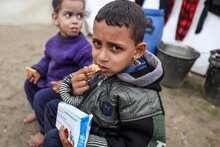EU helps WFP sustain food lifeline in Gaza as hardships mount
JERUSALEM – The United Nations World Food Programme (WFP) in Palestine welcomed a contribution of €2.95 million (US$3.6 million) from the European Union to support critical food assistance to severely vulnerable Palestinians in the Gaza Strip.
The funds – channelled through the European Commission's European Civil Protection and Humanitarian Aid Operations department (ECHO) – will allow around 210,000 extremely poor people to purchase the food of their choice for one and a half months.
Each family member will receive a monthly entitlement of just over US$10 credited onto their WFP electronic voucher card that they can use within selected retail shops. At a time when poverty and unemployment have reached unprecedented heights, WFP has been increasingly relying on the local private sector to channel assistance and stimulate a crippled economy.
The collapse of the socio-economic fabric in Gaza has resulted in an unprecedented humanitarian crisis that has taken a devastating toll on the poorest. Gazan residents, who suffer the consequences of growing restrictions to basic social services and a shrinking job market, are trapped in a circle of poverty and anguish.
”Our strong and long-lasting partnership with EU Humanitarian Aid is instrumental in helping the poorest cope with growing deprivations and a rapid decline in their socio-economic conditions,” said WFP Representative and Country Director in Palestine Stephen Kearney. ”WFP’s food assistance and all other forms of support are now more critical than ever to avert a deepening humanitarian crisis. This is our collective responsibility.”
In Gaza, poverty and unemployment affect half of the population. The year-long energy crisis has left households with as little as four hours of power a day, putting enormous strain on health, water and sanitation systems as well as on all productive sectors. Salary cuts and payment delays for tens of thousands of public sector employees have curtailed people’s purchasing power and made their debt burdens worse.
WFP serves people who are most acutely hit by lack of job opportunities and who rely on a daily income of less than US$1 to cover their basic housing, clothing and food expenditures. This is significantly below the national deep poverty line of US$3.7. These people often skip meals, take on debts and rely on support from neighbours and friends.
‘‘The alarming degree of food-insecurity in Gaza is one of the consequences of the blockade and the pressing conflict. The EU, in cooperation with WFP, is doing its utmost to support the most vulnerable and cover their immediate food needs,” said Michelle Čičić, Head of ECHO office in Palestine.
Since January, WFP has been providing assistance to 245,000 extremely poor and severely food-insecure people through direct food rations or food electronic vouchers. Additional resources are needed to continue assistance until the end of the year without disruption.
Support to these vulnerable communities is provided in partnership with the Ministry of Social Development and the INGO Global Communities.
# # #
The United Nations World Food Programme - saving lives in emergencies and changing lives for millions through sustainable development. WFP works in more than 80 countries around the world, feeding people caught in conflict and disasters, and laying the foundations for a better future.
Follow us on Twitter @WFP_MENA
For more information please contact (email address: firstname.lastname@wfp.org):
Raphael du Boispean, WFP/Jerusalem, Mob. +972 546773160
Yasmine Abuelassal, WFP/Jerusalem, Mob. +972 546773170

